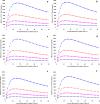Peak capacity optimization in comprehensive two dimensional liquid chromatography: a practical approach
- PMID: 21145554
- PMCID: PMC3034304
- DOI: 10.1016/j.chroma.2010.10.096
Peak capacity optimization in comprehensive two dimensional liquid chromatography: a practical approach
Abstract
In this work we develop a practical approach to optimization in comprehensive two dimensional liquid chromatography (LC x LC) which incorporates the important under-sampling correction and is based on the previously developed gradient implementation of the Poppe approach to optimizing peak capacity. The Poppe method allows the determination of the column length, flow rate as well as initial and final eluent compositions that maximize the peak capacity at a given gradient time. It was assumed that gradient elution is applied in both dimensions and that various practical constraints are imposed on both the initial and final mobile phase composition in the first dimension separation. It was convenient to consider four different classes of solute sets differing in their retention properties. The major finding of this study is that the under-sampling effect is very important and causes some unexpected results including the important counter-intuitive observation that under certain conditions the optimum effective LC x LC peak capacity is obtained when the first dimension is deliberately run under sub-optimal conditions. In addition, we found that the optimum sampling rate in this study is rather slower than reported in previous studies and that it increases with longer first dimension gradient times.
Copyright © 2010 Elsevier B.V. All rights reserved.
Figures




References
Publication types
MeSH terms
Substances
Grants and funding
LinkOut - more resources
Full Text Sources

